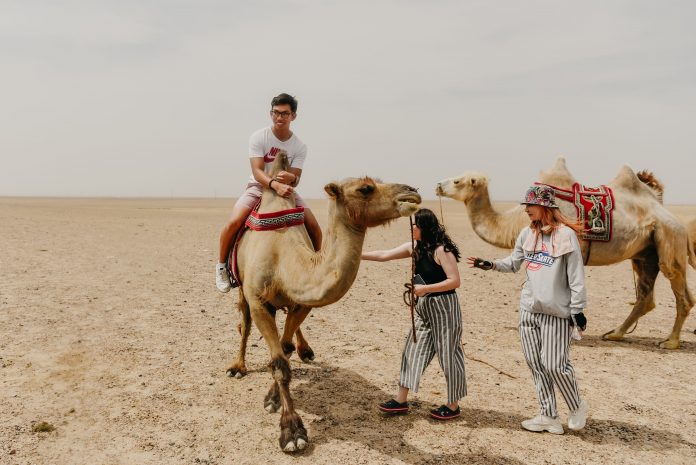Since 2018, the Freeman Foundation has sponsored up to 24 students from the College of William and Mary to complete eight-week internships in Asia. Through a rigorous application process, Freeman Intern Fellows are matched with one of the foundation’s international partners — ranging from government entities to private companies and non-profit organizations — and receive up to $6,000 to cover living expenses.
Professor Francis Tanglao Aguas, faculty director of the Freeman Intern Fellowships in East Asia Program and professor of Theater and Asian & Pacific Islander American studies at the College highlighted the program’s emphasis on cross-cultural awareness and self-reliance skills.
“Living and working abroad while receiving full funding to do so is, of course, a once-in-a-lifetime opportunity,” Aguas said. “We hope for our APIA-AMES Freeman Intern Fellows to have experienced how the diverse East Asian locations facilitate and foster work cultures and the relationships that these environments are able to nurture on a personal and professional level.”
For Sean Nguyen ’25, a history and public policy double major, the opportunity to navigate an independent life abroad drew him to the program.
“In the Freeman Fellowship, all the reins are on you: the independence, the degree of living in a foreign country and how you navigate and choose to spend your day,” Nguyen said. “All of that is up to your jurisdiction.”
Nguyen was matched with the Sant Maral Foundation in Ulaanbaatar, Mongolia, where he conducted research on Mongolian legislation’s impact on Mongolian-Kazakh relations. In Mongolia, many Kazakhs migrated from the former Soviet Union and settled along the western border with present-day Kazakhstan. The geographic distance between Mongolian-Kazakhs and the capital is the furthest among all ethnic groups in Mongolia.
“Because that distance is so huge, there’s a large involvement of the Mongolian government on that individual body and entity,” Nguyen said.
Nguyen then drafted a report summarizing the findings that is currently under revision. Additionally, he conducted analyses of the polling data to spot inconsistencies and run quality assurances.
“For the most part, Mongolian legislation just does not impact Kazakhs,” Nguyen said. “They have a peaceful coexistence with the Mongolian government and Mongolia. I think in part because they’re so geographically distant, there’s just no need for the state administration to have any direct implication.”
During his internship, one of his main projects involved field research in Bayan-Ögli, Mongolia’s westernmost aimag, or province. Through his observations and interviews, he found that the most significant disparities existed in the education system.
“What we noticed is that in these public schools, teachers are oftentimes bribed, so they don’t need to teach well, and there’s not much emphasis on succeeding in the long-term,” Nguyen said. “But for [students] who are in private schools, they tend to be able to move up on the social ladder. And the goal for almost everyone I talked to is for them to leave Bayan-Ögli.”
As Bayan-Ögli continues to rank the worst on standardized tests yearly, there is little the locals can do about the flawed system.
“Oftentimes, this is also why people are very upset and bitter. The state education administration always asks, ‘Why is Bayan-Ögli always the worst consistently, year to year?’” Nguyen said. “And yes, you can fault the public education system. That’s largely why there’s so much social media discourse, like teachers complaining to other teachers, like, ‘Hey, can all just acclimate to better education?’ But that can’t happen right now because of how the public schools are set up.”
While he dedicated lots of time to his research, Nguyen also explored Mongolia to see everything the country had to offer. One of his most memorable moments was visiting the Gobi Desert.
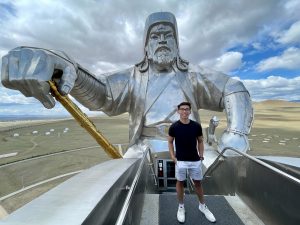
“I brought no hat, no sunglasses, not even sunscreen,” Nguyen said. “I was so silly for it, and it was somehow the most horrible and beautiful experience of my life. Just getting to be in the blistering heat, riding camels, hiking up large sand dunes and seeing overtop of the Gobi Desert.”
And within the span of two months, Nguyen established meaningful daily routines and connections with locals.
“Because I was solo-traveling, I made an active effort to interact with everyone to the highest degree possible,” Nguyen said. “For instance, there was this one day I was in the sauna at the gym, and I heard an English-speaking voice…. So I stayed in a 200-degree sauna for 40 minutes just to have a conversation with someone. And through that, I was able to develop a friendship.”
Mongolian hospitality especially left an indelible impression on his outlook on multicultural interactions.
“Now that I’ve been there, all I want to do is go back because it is a country that has, by far, the most independent and unique culture ever seen for around 3.3 million people,” Nguyen said. “It’s also one of the least dense. And yet, I was literally running into friends I met in Ulaanbaatar because it’s a close-knit space, and especially when you’re in the countryside, it’s so kin-based that I could just walk into households because I would be like, ‘Yeah, I know this guy.’”
Other Freeman Fellows chose to travel to different locations. Isabella DiFulvio ’23, a computer science and Asian and Pacific Islander American studies double major, interned at the Philippine Social Science Council in Manila. Along with another student at the College, her major task was developing a one-stop website that housed all the social science databases created by government agencies and non-government entities.
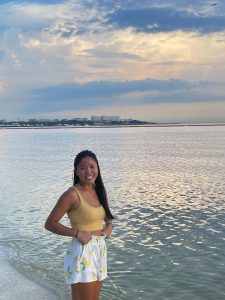
“[PSSP] really wanted to have some sort of application they can provide for social science researchers to allow them to access data,” DiFulvio said. “They previously had data spread around different organizations in the Philippines, but they never had a coherent, drawn-out map of where you could find what kind of data.”
Since PSSP did not have a full-time technical employee, or even someone knowledgeable in databases, the entire project landed on DiFulvio and her partners’ shoulders. As a small non-profit organization, DiFulvio realized that her supervisor’s expectations had to be adjusted to accommodate their existing resources and timeframe.
“I was, like, ‘Well, this scope is huge,’” she said. “So ultimately, we had to change directions there, and we went with a website. My job was, from start to finish, to develop the design, think about what this website could be and think about what the requirements were.”
Naturally, DiFulvio had to follow a strict schedule to ensure the project’s timely completion.
“I developed the requirements myself and created a whole weekly mapping of what things needed to be done at which point — basically, a sprint cycle for myself,” DiFulvio said. “And then I developed [the website] with Grace, implemented it, tested it and got feedback from other people.”
Despite the tasks’ enormity, DiFulvio felt adequately prepared to take them on because of her previous internship experiences.
“There was an internship during the summer before this that definitely helped me with project management and developing requirements for myself,” she said. “I think I had the tools to do that from my experience at AdImpact — they were a very huge database company.”
Outside of work, DiFulvio had to quickly adapt to life in Manila, a sprawling metropolis where she didn’t know anyone and couldn’t speak Tagalog.
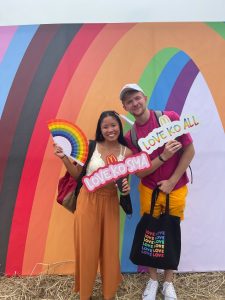
“I’ve had jobs before, but living in a whole different country alone is something I’d never experienced,” DiFulvio said. “It was really lonely. You have a lot of time when you literally know nobody in a country.”
Moreover, she had time to muse about the experience of being Asian American in Asia, where people often assumed she was Filipino until she opened her mouth to speak English.
“It was also really interesting how being an Asian American was in the Philippines,” DiFulvio said. “People were just so confused about me. They either assumed that I was Filipino, or they assumed that I was just a rich Filipino because the national language is English there.”
DiFulvio got to step out of her comfort zone and experience everyday life from a non-American perspective.
“The biggest thing I took away from the internship was how cool it is to be around people from a non-American-centered experience,” DiFulvio said. “Just being American, you’re taking for granted how, culturally, everything is surrounded by America…. It was so cool to be in an environment that was completely different to me.”
A few thousand miles away in Cambodia, Pietro Marino ’23 was also embarking on his own journey. Marino, a government and marketing double major, has always had an interest in Asian cultures. Having studied Mandarin since the sixth grade and spent four weeks at homestays in Japan in 2017, applying to the Freeman Fellowship was a no-brainer for him.
“With the Freeman Fellowship in particular, I felt like it provided the best of both worlds in that I got that semester abroad experience, but I also got the work experience, the internship experience that I needed as a junior going into the summer,” Marino said.
Marino interned at the Affiliated Network for Social Accountability in Phnom Penh, Cambodia. His work contributed to the organization’s mission to fight corruption, bolster human welfare and protect the rights of citizens through promoting good governance.
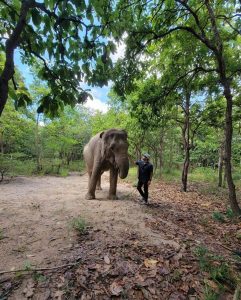
“I was with two other people, but we kind of all did our own projects while working there,” Marino said. “My main focus was on grant management projects — so basically helping the non-profit apply for grants through USAID, Oxfam and a couple of other big aid organizations. I did a bunch of research on the environmental considerations for communities living along the Mekong River Delta.”
Marino noted that one of the perks of working at a non-profit is getting hands-on experience and forming close connections with clients. On his second day, Marino attended a local NGO conference where he got to network with other representatives and solicit new donors.
“A $1,000-2,000 grant for [local organizations] goes so much farther than it does in America,” Marino said. “Just thinking about all the opportunities and flexibility that they can do with that kind of money, and networking with them brings ways to collaborate together to get that funding. That was really valuable.”
Marino contrasted the fast-paced college lifestyle with the more laid-back atmosphere of a non-profit, which came as a bit of an initial shock. On a grant application for a Mekong River Delta project, for example, his supervisors took a hands-off approach and entrusted him with the entire process.
“I was like, ‘Do you have any materials that you want me to reference, any of your prior work that I should include?’” Marino said. “They were like, ‘No, whatever you come up with is what we’re going to submit.’ And as an intern, I was like, ‘Man, my application is the application that’s going to be submitted on behalf of ANSA.’”
Naturally, this level of responsibility comes with a degree of pressure.
“You want to make sure that your work is the best as you can make it,” Marino said. “Because I’m not only representing myself, I’m now representing the entire organization and [doing] things you would ever expect to do.”
In line with ANSA’s mission, Marino and his colleagues developed a social youth festival for rural residents to network with community leaders, NGOs and business stakeholders across a three-day conference. It is slated to start in early 2023.
“I think engaging the youth is such a great way to instill the type of values like social accountability, transparency and good governance that ANSA is trying to promote,” Marino said. “So, I think this would be a great out-of-classroom experience for Cambodian students.”
Like the other Freeman Fellows, Marino felt that forming connections with his city enriched the overall experience.
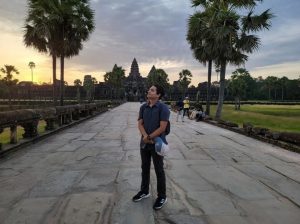
“By the end of the trip, I felt super comfortable in Phnom Penh, and it felt like my second home,” Marino said. “I had my main couple of spots — there was a burger shack that I would often go to and talk with the British owner. Having those one-on-one connections with people, whether they were expats or Cambodians, was really cool.”
When students return in the fall semester, Freeman Intern Fellows are required to enroll in a fall course called Freeman Fellows Think Tank.
“The think tank is where they practice being a Freeman Fellow, and not a traditional student, because they are given the agency to shape their time in the class,” Aguas said. “For the 2022 cohort, they have embraced ownership, so to speak, of the fellowship and organized as a team assisting me and my colleagues in spreading word and propagating the story of the AMES-APIA Freeman Fellowship.”
For students looking to apply for next year’s cohort, Aguas had the following piece of advice.
“We interview the applicants to dialogue with them on their readiness to be open-hearted, wide-minded, adaptable, flexible, resourceful and quick on their feet because living and working abroad for the first time for anyone is already challenging, and that grows exponentially with the current global challenges that create constant flux that our Fellow have to adapt and adjust to,” Aguas said.
Applications for the summer 2023 round of the Freeman Fellows Program open on Nov. 1, 2022 until Dec. 1, 2022.

